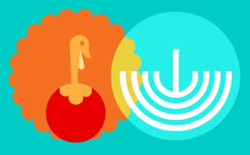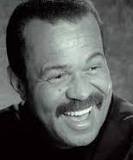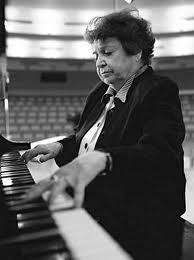 Whenever I meet with a new student one of the things I make sure to tell her/him during our first session is "I am going to learn a lot more than you are." More often than not this elicits a nonverbal facial response "Are you kidding me?" But I kid you not, as all teachers know, this is the truth. Pirkei Avot (Ethics of the Sages) 1:6 teaches, "עשה לך רב וקנה לך חבר’, "Get yourself a teacher, secure for yourself a friend". Rabbi Rami Shapiro gets to the heart of it for me, commenting "A teacher shares what she knows; a friend helps clarify what you know" And that is what happened yesterday in my study session with Raviv, with whom I am studying in preparation for her becoming bat mitzvah next July (we are studying via Skype, she is living in Brazil for two years with her family) At some point in our conversation I wished her a Happy Thanksgivvikuh, and wondered if she would be celebrating both holidays in Brazil. She told me that they indeed were planning on celebrating both Thansgiving and Hanukkah, but that she prefers referring to it as Chanukiving, with the Jewish holiday being the first part of the mash. Raviv is right. In our impulse to recognize both our Americna and Jewish claims we have erred, and in doing so have sent the wrong message to ourselves and to our Jewish-American friends. (Note that we rarely refer to ourselves as "American-Jewish") In a blog post by my friend and colleague Rabbi Mindy Portnoy, she writes, "This year, the entire eight days of Chanukah stand firmly on their own, a separate ritual, metaphorically marking a separate people and tradition, which might not have survived without those brave, controversial, and (yes!) fiercely anti-Hellenistic Maccabees and the creative rabbinic spiritual interpretative layer of a tiny vial of oil. Do we really have to transform these miracles into an over-hyped, commercialized Thanksgivvikuh?" The first time I heard the phrase Thanksgivvikuh it made me laugh - how clever, how creative. And what a great opportunity for a good drash - the quest for religious freedom, how food plays an important part in ritual in helping to raise a secular milestone to the higher level of sanctity. But Raviv is right. Jews have a older narrative, and there is power in our particularism that needs to honored first. America is not the melting pot in which we lose our identities, but one in which we re-imagine ourselves and rejoice in it through the lens of tradition. This past week I was sent a joke that at first made me cringe. Mr. Christian chastises his next door neighbor Mr. Cohen: 'Your son is not going near my kid again; he just has no respect for us and our religion!' 'What's the matter; what did he do?' inquired Mr. Cohen. 'I'll tell you'. said Mr. Christian in a rage. 'He saw our Christmas tree and started making fun.' Really, what did he say?' continued Mr. Cohen. Mr. Christian said, 'He saw our tree and started asking all sorts of ridiculous questions - which kinds of pine trees can be used for a Christmas tree? What's the minimum required height? How close to the window does it need to be? Do too many decorations render it unfit? What if it's under a neighbor's balcony?!' At first, my reaction was probably like yours - oy, the Jews, we're so wrapped up in halacha, the proper way to do things, that we lose sight of the spirit of the thing and suck all the joy out of the moment. There is some truth to that. But isn't is also true that "G!d is in the details"? That the intention with which we do something cannot be divorced from the process of what we do? In fact, sometimes it is more important. (i.e. "It's not what you said, it's the way you said it") Chanukiving? Thanksgivvikuh? The way we say it is important, because it says so much about how we see our Jewish identity within the broader context of living in the "land of the free". And besides, Chanukiving might be read as חנו-giving, give with grace. I kinda like that. It is something that I aspire to do. So thanks Raviv, for being my teacher and helping to clarify what I know. (and an early) Happy Hanukkah to everyone. Shabbat Shalom, R' Mark
1 Comment
 We still get the newspaper delivered every day. I have been lobbying lately for subscribing to only the digital edition of the paper in order to save the lives of a few trees (OMG, could I be reading newspapers made from the same trees that the JNF planted in my name when I was in Hebrew school??) In any case, my daughter Kaziah nixed the idea, because it would make it far too difficult and far too time consuming for her to read the 2 pages of comics that she consumes in the Washington Post every day. And my wife Renée likes to cut out recipes from the Food section, which let's face it, cannot be done on a computer regardless of its' cut and paste options. I must admit that I need the paper too. Otherwise, I couldn't say that we "get the paper" every day and, I wouldn't have the obituaries to read. Does anyone know whether it is true or an urban myth that would-be renters in NYC read the obits and then pounce on the apartments that the now deceased left unoccupied? Can anyone confirm or put to rest this idle roomer? (sic, pun intended, or sick pun, intended) Either way, the obits hold a certain fascination for me. And becuase of what what published in today's paper, I got to meet three people whose lives would otherwise have gone unnoticed and unappreciated by yours truly. What makes it all the more lovely is that all three were music lovers. The picture above is of Lambert Bartak (pretty darn close to Bartok don't you think?) who died last Tuesday, November 5th, at the age of 94. For over a half century Mr. Bartak was the organist at Omaha's Rosenblatt Stadium, entertaining the crowds for the College World Series. Bartak also played the organ for minor league baseball's Omaha Royals from 1973 to 2002. In 1988, he was ejected from a game when he played the theme song from "The Mickey Mouse Club" during an onfield argument between the Royals' manager and an umpire over a call. Talk about the power of music!  Al Johnson died on October 26. He was only 65 (Uh-oh, I just turned 60 last week), and I wonder if any of you recall his 1960's rhythm and blues vocal group called the Unifics, because I sure don't. But Mr. Johnson went on to produce and arrange for Roberta Flack, Peabo Bryson, and Jean Carne. I just love the truth of what he had to say about love songs: "For something that causes so much pleasure, love causes a whole lot of pain. Love songs allow you to experience the emotion without having to do the roadwork or, if you have been through the mill, make you feel that it was somehow for a worthy cause." I'll say.  The third person I had the privilege to meet today is Chana Mlotek, who died at her home in the Bronx on November 4. Music archivist at YIVO, she was an impassioned collector of Yiddish songs. Isaac Beshavis Singer once called Chana and her husband Joseph, "the Sherlock Holmeses of Yiddish folk songs." In 1970 the couple began writing a column in the Jewish Daily Forward called "Perl Fun Der Yiddishe Poezie" ("Pearls of Yiddish Poetry") One section of their column, "Readers Recall Songs," asked readers to submit small portions of songs they remembered from their youth. The Mloteks would then research and identify these songs and write about them. One of the most memorable letters came from a man who had been in a concentration camp. A boy there sang, "My Yiddishe Mame," and the Nazi officer was so moved that he told the guard to give the Jews another bowl of soup. A week after the letter was published in the column, a writer wrote that he was the boy who sang the sentimental song, and a week after that, another letter came from someone who said, "I was there too." As an enthomusicologist and folklorist, Chana said that songs were powerful stimulants to retrospection. "There's a song everybody loves." She wrote her first research paper on a song called, "The Beard" in which a wife asks her husband why he cut off his beard because she no longer recognizes him. "I found it to be a poem by Mikhl Gordon from 1868," Chana said, "It went through many different translations and melodies. When a songs is transmitted orally like that, it becomes folkloric." (BTW, my family folklore has it that many years ago my father-in-law came home having shaved off his beard. My late mother-in-law told him, "If you shave it again, don't bother coming home") Lambert Bartak, Al Johnson, Chana Mlotek and my late mother-in-law Randy Brachfeld. May their memories be for a blessing. |
Mark Novak is a "free-range" rabbi who lives in Washington DC and works, well, just about everywhere. In 2012 he founded Minyan Oneg Shabbat, home to MOSH (Minyan Oneg Shabbat), MindfulMOSH (Jewish mindfulness gathering), and Archives
June 2017
Categories
All
|
 RSS Feed
RSS Feed
